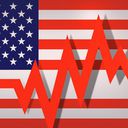New inflation numbers make a soft landing less likely

There's no sugar-coating it: August's inflation numbers were terrible news for everyone rooting for the economy to come in for a soft landing.
The big picture: Yes, the prices of gasoline and other forms of energy fell. But prices of most of the other things people buy — including essentials like food, rent and medical care — are still rapidly rising.
Why it matters: After soft July readings, there was good reason to hope that the U.S. was gliding toward lower inflation without much economic distress. The new numbers undermine that hope.
- It now looks as if July was a head-fake. Underlying inflation remains high and entrenched, and in some sectors still accelerating.
- That probably doesn't change the Federal Reserve's plans to raise interest rates another 0.75 percentage point next week. But it does raise the odds of sustained tightening for the remainder of this year.
- That, in turn, raises the risk the Fed may cause a recession as it attempts to throttle inflation.
By the numbers: The overall Consumer Price Index rose a mild 0.1% in the month, but that was helped by a 10.6% drop in gasoline prices. The underlying details were considerably more alarming.
- Excluding food and energy, prices were up 0.6% in August. Over the last three months, all items except energy rose at a 7.4% annual rate, faster than during the spring.
- Shelter costs rose 0.7%, the highest in a single month since 1991. Medical care costs were also up 0.7%. Both accelerated from earlier in the year.
- Even as prices rose for services, there was no corresponding decline in prices of physical goods. Prices kept rising for new cars and trucks (+0.8%), furniture and bedding (+0.5%) and outdoor equipment (+1.2%).
Between the lines: The sheer breadth of these pressures suggests our inflationary woes are not just isolated to a few sectors hit by the pandemic or the Russia-Ukraine war.
- Rather, it points to an overall economy that is simply too hot, with more money sloshing around than goods and services that are available.
What they're saying: The Conference Board's Alan Cole said on Twitter: "Our inflation reads lately have shown the limitations of micro-based inflation explanations ('X is happening in Y sector') relative to macro-based ones ('nominal incomes are high, and the money will be spent on something.')"
That explains why odds that the Fed's target rate will be ab0ve 4% by the end of the year soared to 80% this morning, up from about 25% yesterday, based on futures prices calculated by the CME Group.
The bottom line: Get ready for tighter money as the central bank reads into this report more urgency to act.